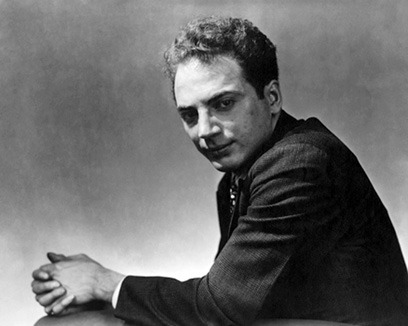
 This past November, I had the great pleasure of catching Lincoln Center’s 75th anniversary revival of Clifford Odets’ Golden Boy directed by Bartlett Sher. In short, this production is a sheer knockout – double pun intended. Mr. Sher, best known for his Lincoln Center productions of The Light in the Piazza and South Pacific, is one of Broadway’s most gifted directors. Much like the National Theatre’s Nicholas Hytner, Sher has shown a masterful directorial hand in nearly every genre from Shakespeare (Cymbeline) to political drama (Blood and Gifts) to musical comedy farce (the under-appreciated Women on the Verge of a Nervous Breakdown) and classical opera (Rossini's Il barbiere di Siviglia, among others). With his intelligent interpretations and respectful subtlety, his work is always genuine, emotional, and thought provoking. For fellow directors and students of the theater, his productions are master classes in storytelling, spacing, and fluidity. I have been fortunate enough to catch nearly all of Bart's exquisite New York outings and his latest, Golden Boy, does not disappoint with its stellar cast (one that would have given The Group Theater a run for its money) and its gorgeous sets and costumes by frequent Sher collaborators Michael Yeargan and Catherine Zuber, respectively,
This past November, I had the great pleasure of catching Lincoln Center’s 75th anniversary revival of Clifford Odets’ Golden Boy directed by Bartlett Sher. In short, this production is a sheer knockout – double pun intended. Mr. Sher, best known for his Lincoln Center productions of The Light in the Piazza and South Pacific, is one of Broadway’s most gifted directors. Much like the National Theatre’s Nicholas Hytner, Sher has shown a masterful directorial hand in nearly every genre from Shakespeare (Cymbeline) to political drama (Blood and Gifts) to musical comedy farce (the under-appreciated Women on the Verge of a Nervous Breakdown) and classical opera (Rossini's Il barbiere di Siviglia, among others). With his intelligent interpretations and respectful subtlety, his work is always genuine, emotional, and thought provoking. For fellow directors and students of the theater, his productions are master classes in storytelling, spacing, and fluidity. I have been fortunate enough to catch nearly all of Bart's exquisite New York outings and his latest, Golden Boy, does not disappoint with its stellar cast (one that would have given The Group Theater a run for its money) and its gorgeous sets and costumes by frequent Sher collaborators Michael Yeargan and Catherine Zuber, respectively, In a recent Lincoln Center blog entry, Sher commented: "It's hard to get people to understand how the play's central young character, Joe Bonaparte, could have felt a pull between the artistic fulfillment of playing the violin and the money-making of being a top boxer." He continues, "Joe's initial dilemma wouldn't occur to them in the same way. Today, money and fame are the primary goals, no question." Sher can rest assure the relevance of Odets' piece is as strong today as when it was first written. Its poignancy will be appreciated, particularly amongst members of Generation Y - many of whom have come of age in this post-9/11 world. When Golden Boy first premiered in 1937, the times were not much different than they are today. We were then and are now a country recovering from the greatest economic setbacks known to the generations of the times. The struggle for economic security and the quest for personal glory is one that will live on indefinitely.
In a recent Lincoln Center blog entry, Sher commented: "It's hard to get people to understand how the play's central young character, Joe Bonaparte, could have felt a pull between the artistic fulfillment of playing the violin and the money-making of being a top boxer." He continues, "Joe's initial dilemma wouldn't occur to them in the same way. Today, money and fame are the primary goals, no question." Sher can rest assure the relevance of Odets' piece is as strong today as when it was first written. Its poignancy will be appreciated, particularly amongst members of Generation Y - many of whom have come of age in this post-9/11 world. When Golden Boy first premiered in 1937, the times were not much different than they are today. We were then and are now a country recovering from the greatest economic setbacks known to the generations of the times. The struggle for economic security and the quest for personal glory is one that will live on indefinitely. In Golden Boy, Joe's father, Mr. Bonaparte (played superbly Tony Shalhoub), wants what all parents ultimately dream for their children: much happiness and success. Mr. Bonaparte is explicit - he wants Joe to find "truthful success" by living an examined life defined by its authenticity. When Mr. Carp (an endearing Jonathan Hadary), the Bonapartes' neighbor, questions if "a boy can make a living playing this instrument [violin] in our competitive civilization today?" he responds, "I don't expect Joe to be a millionaire. He don't need to be a millionaire. A good life's possible [...] Joe love music. Music is the great cheer-up in the language of all countries."
In Golden Boy, Joe's father, Mr. Bonaparte (played superbly Tony Shalhoub), wants what all parents ultimately dream for their children: much happiness and success. Mr. Bonaparte is explicit - he wants Joe to find "truthful success" by living an examined life defined by its authenticity. When Mr. Carp (an endearing Jonathan Hadary), the Bonapartes' neighbor, questions if "a boy can make a living playing this instrument [violin] in our competitive civilization today?" he responds, "I don't expect Joe to be a millionaire. He don't need to be a millionaire. A good life's possible [...] Joe love music. Music is the great cheer-up in the language of all countries."
While today's parents more often than not encourage their children to shelve their dreams for more practical and profitable livelihoods, the spirit of Mr. Bonaparte lives on in today's institutions of higher education, particularly those Jesuit schools like the College of the Holy Cross (where Mr. Sher and I completed our undergraduate degrees) and Boston College. These schools encourage its students to explore their passions and discern personal vocations filled with meaning and reward. Very frequently, these vocations are not the most profitable - especially for those with interests in the arts and social services. As you follow the careers of these graduates, you commonly see the struggling actor shift gears and pursue a career in corporate sales or the underpaid social justice advocate suddenly decide to join the ranks in law school (I apologize for the stereotypes!). But what is lost when the love and zeal is stifled? Herein lies the true tragedy of Golden Boy.
 Throughout the three-act play, we witness pure ambition drive Joe from a wide-eyed (though cockeyed), thoughtful, poetic musician to a hardened fighter with a "wolf inside." Joe is played effectively by Seth Numrich (last seen in the visually stunning and dramatically satisfying War Horse). Numrich makes us empathize with Joe's drive ("I don't like myself, past, present, and future), loathe his pride ("What good is immodesty? I'm a fighter! The whole essence of prizefighting is immodesty!"), yet still fear for his ultimate fall. Numrich shows us Joe's honest struggles between satisfying his own dreams and fulfilling the love and loyalty he feels toward his family. When Mr. Bonaparte is forced to face the man his son has become, he laments, "Now I know... is'a too late for music...not like you. The men musta be free an' happy for music." Even Lorna Moon (Yvonne Strahovky in a breakout role), the hard-boiled but vulnerable fiance of Joe's manager, regrets what fame and fortune has done to Joe. It is not until Joe must confront his own destructive potential through the unintentional death of Chocolate Drop in the ring that he realizes how much he has changed from that "kid with the Buster Brown collar and violin case tucked under his arm."
Throughout the three-act play, we witness pure ambition drive Joe from a wide-eyed (though cockeyed), thoughtful, poetic musician to a hardened fighter with a "wolf inside." Joe is played effectively by Seth Numrich (last seen in the visually stunning and dramatically satisfying War Horse). Numrich makes us empathize with Joe's drive ("I don't like myself, past, present, and future), loathe his pride ("What good is immodesty? I'm a fighter! The whole essence of prizefighting is immodesty!"), yet still fear for his ultimate fall. Numrich shows us Joe's honest struggles between satisfying his own dreams and fulfilling the love and loyalty he feels toward his family. When Mr. Bonaparte is forced to face the man his son has become, he laments, "Now I know... is'a too late for music...not like you. The men musta be free an' happy for music." Even Lorna Moon (Yvonne Strahovky in a breakout role), the hard-boiled but vulnerable fiance of Joe's manager, regrets what fame and fortune has done to Joe. It is not until Joe must confront his own destructive potential through the unintentional death of Chocolate Drop in the ring that he realizes how much he has changed from that "kid with the Buster Brown collar and violin case tucked under his arm." When Joe turns his back on his artistry and his family, he destroys a bit of himself and his humanity. Joe confides to Lorna, "With music I'm never alone - Playing music...that's like saying, 'I am man. I belong here." Before meeting his demise, he see's the wisdom in his trainer Tokio's warning: "Joe you're loaded with love. Find something to give it to. Your heart ain't in fighting...your hate is. But a man with hate and nothing else...he's half a man...and half a man...is no man." Without his hands, music, and family, Joe is left a half of man with truthful success a lost dream.
When Joe turns his back on his artistry and his family, he destroys a bit of himself and his humanity. Joe confides to Lorna, "With music I'm never alone - Playing music...that's like saying, 'I am man. I belong here." Before meeting his demise, he see's the wisdom in his trainer Tokio's warning: "Joe you're loaded with love. Find something to give it to. Your heart ain't in fighting...your hate is. But a man with hate and nothing else...he's half a man...and half a man...is no man." Without his hands, music, and family, Joe is left a half of man with truthful success a lost dream.
Like Joe Bonaparte, members of Generation Y struggle with remaining true to ourselves and achieving greater lives whether in terms of money, power, or respect. Whatever stage in life you're at, I encourage you to evaluate what you want to achieve in life, but more importantly ask yourself 'why?' When interviewing prospective MBA students, I would often ask candidates to share their thoughts on these very topics. For example, if I was interviewing a student with a strong interest in corporate finance, I'd frequently ask, "What is it about analyzing Excel spreadsheets all day long that will get you up in the morning?" While there is no right or wrong answer to this question - after all, it is perfectly natural for motivations to vary from person to person - I wanted to ensure that the Boston College student body was comprised of individuals who were conscientious and self-reflective. As Socrates said, "The unexamined life is not worth living." And as Odets illustrates in this classic American tragedy, much is lost even in circumstances where it appears there is much to be gained.
For tickets to see Golden Boy: Visit http://www.telecharge.com/behindTheCurtain.aspx
Under 35 years old? Get tickets for a steal at $30 a pop by signing up for LincTix: http://lct.org/linctixMain.htm
